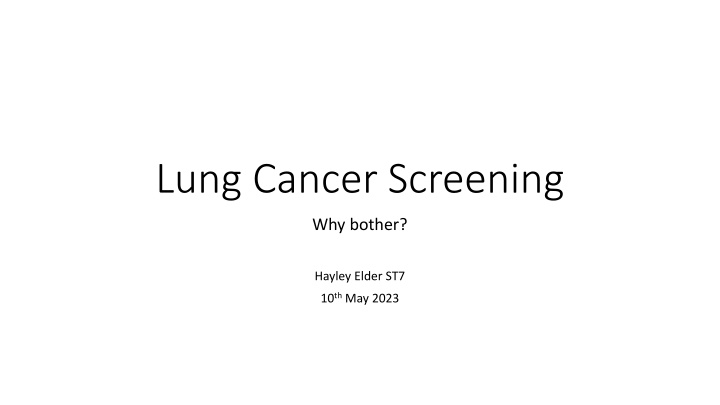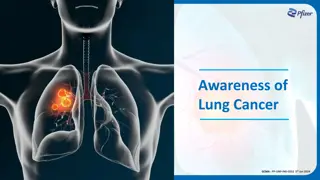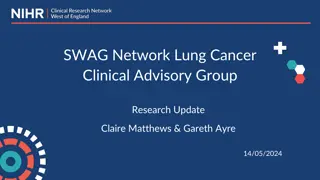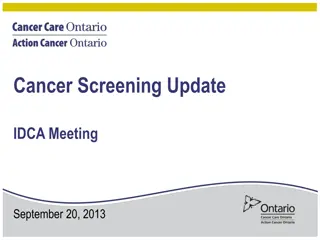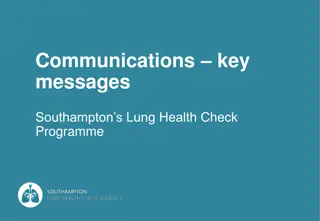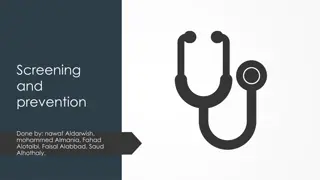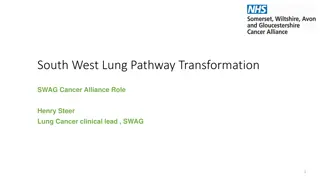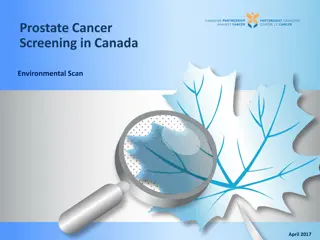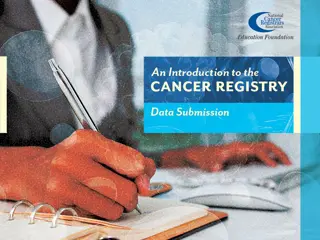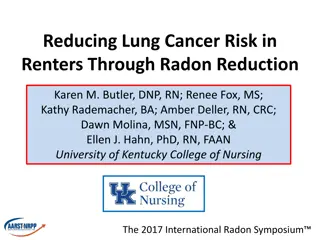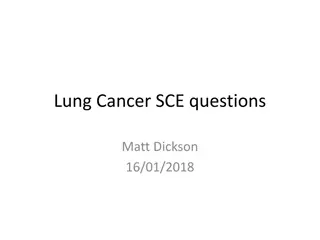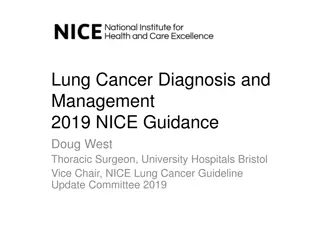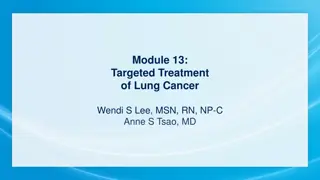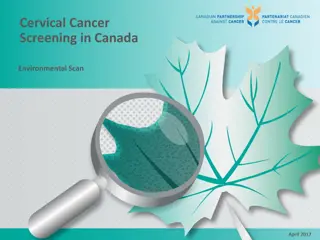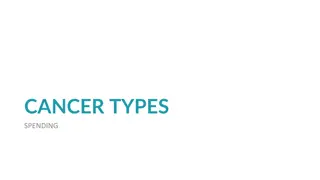The Importance of Lung Cancer Screening: Understanding the Necessity
Lung cancer remains a significant issue, with 48,000 new cases annually in the UK and high mortality rates. The impact of COVID-19 on treatment accessibility and outcomes is also highlighted. Early detection through screening can lead to improved survival rates, emphasizing the need for effective screening programs.
Download Presentation

Please find below an Image/Link to download the presentation.
The content on the website is provided AS IS for your information and personal use only. It may not be sold, licensed, or shared on other websites without obtaining consent from the author.If you encounter any issues during the download, it is possible that the publisher has removed the file from their server.
You are allowed to download the files provided on this website for personal or commercial use, subject to the condition that they are used lawfully. All files are the property of their respective owners.
The content on the website is provided AS IS for your information and personal use only. It may not be sold, licensed, or shared on other websites without obtaining consent from the author.
E N D
Presentation Transcript
Lung Cancer Screening Why bother? Hayley Elder ST7 10thMay 2023
Aims Lung Cancer Epidemiology how big is the problem Development of Lung Cancer Screening / TLHC
Lung Cancer Epidemiology 48,000 patients are diagnosed with Lung Cancer every year in the UK. Many are diagnosed at advanced stages. Around 35,000 deaths per year from Lung Cancer. Most common cancer death annually. 16.2% 5 year survival and 9.5% 10 year survival. Smoking is estimated to be cause of 72% lung cancer cases and 86% lung cancer deaths. Proposed to be a 30 year lag between smoking prevalence and lung cancer rates. Therefore: current rates of lung cancer represent smoking patterns in the 1990s.
NLCA 2022 Surveyed data from 2019 & 2020. 1 year survival of patients in England and Wales was 40.7%. Median survival from diagnosis 316 days. Impact of COVID seems to have been worse than we thought: In 2019 curative treatment rates of NSCLC stage I/II and good PS were 81%. This fell to 73% in 2020. Surgical resection rate fell from 20-15% in same time frame.
Presentation of Lung Cancer In 2020, patients who were diagnosed: Had a worse performance status. Were more likely to be diagnosed with emergency presentation. Were less likely to have a pathological diagnosis. 31% patients were diagnosed via emergency route in 2019 this worsened to 35% in 2020. Overall, remains better than 39% in 2008. Of those presenting through an emergency route 72% were likely to be diagnosed with late stage lung cancer compared to 45% if diagnosed following GP referral.
Time to Treatment National Optimal Lung Cancer Pathway (NOLCP) Presentation --> Treatment 49 days Diagnosis Treatment Standard cancer waiting times for this interval is 31 days NOLCP recommendation = 21 days NLCA data in 2019 Diagnosis Treatment 28 days NLCA data in 2020 Diagnosis Treatment 27 days NO alliances met the NOLCP target, 16/21 alliances had wait of <31 days
Smoking IN NLCA, smoking status available for 61% in 2019 and 51% in 2020 33% patients were current smokers at time of diagnosis
Respiratory Disease Estimated to cost wider society 9.9 billion each year Admissions have risen over 7 years by 3x rate of all admissions generally. Major factor in winter pressures .
Cancer Over the next two years, we will extend the lung health checks that have already produced strong results in Liverpool and Manchester. During the Manchester trial, 65% of lung cancers were diagnosed at stage 1 and 13% at stage 4, compared to 18% at stage 1 and 48% at stage 4 before the trial. The NHS will use its capital settlement to be negotiated in the 2019 Spending Review in part to invest in new equipment, including CT and MRI scanners, which can deliver faster and safer tests.
TLHC/Lung Cancer Screening Introduction The last time the UK NSC formally considered screening for lung cancer was in 2007. Recommendation = NO screening . The TLHC programme targets those most at risk of lung cancer and will work with Integrated Care Boards (previously CCGs), who have some of the highest rates of mortality from lung cancer. The programme will work with initially ten projects, but then expand to other Integrated Care Boards across England to deliver the programme. It is expected that this programme will run Nationally, covering all areas of England from 2024 onwards.
Deciding the most appropriate type of screening Rather than risk algorithms, most lung cancer screening RCTs have used a range of eligibility criteria based on smoking status and age to identify those who should be invited for screening. LDCT was reported to be more effective but more costly than no screening.
Issues with screening programme The RCTS explored harms associated with lung cancer screening: A substantial number of people who received a false positive result unnecessary tests invasive procedures ??adverse events. Other harms included: Overdiagnosis Incidental findings Short term anxiety and distress.
Public Response I have lost 3 members of my family to this dreadful disease. Two of them were smokers but one, my mother, never smoked in her life but was exposed to a large amount of passive smoking due to her occupation. I too have never smoked but was exposed as a child to passive smoking. I m highly concerned about this condition affecting me but I m currently not eligible for any lung health checks taking place in my area. I am desperate for there to be a national screening programme for this dreadful cancer Recommendation comment: Yes I definitely think there should be a national screening programme as it is the second biggest cancer killer in the UK
Where are we up to today? UK NSC (UK National Screening Centre) asked to recommend that: The NHS in the four UK countries should move towards the implementation of targeted screening programme for lung cancer in adults aged 55 74 with a history smoking acknowledging the challenges and need for a lead in period. The strategy being piloted by the NHSE Targeted Lung Health Check (TLHC) provides a starting point in England and further modelling is required to consider the optimum approach for the UK as a whole. The Adult Reference Group establishes a working group to develop a more refined recommendation incorporating this modelling work and to identify issues on which UK NSC input would be useful.
References GIRFT Lung Cancer NLCA Audit 2022 https://view-health-screening-recommendations.service.gov.uk/lung- cancer/ Targeted Lung Cancer Screening Public Consultation Responses UK National Screening Committee (UK NSC) Targeted screening for lung cancer in adults with a history of smoking External review against programme appraisal criteria for the UK National Screening Committee September 2022 NHS Long Term Plan August 2019
